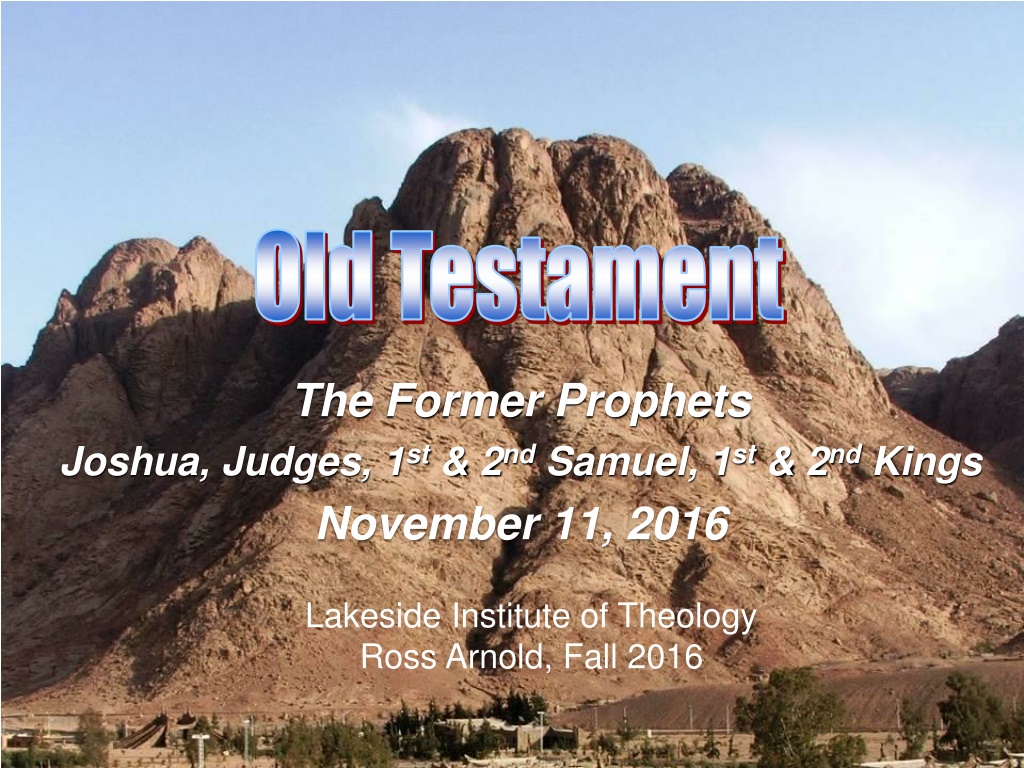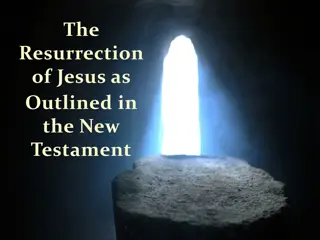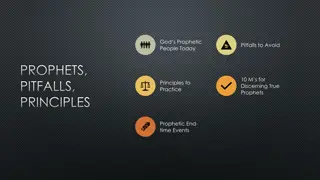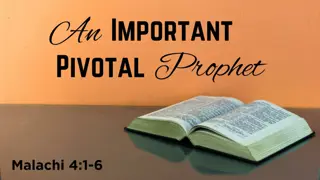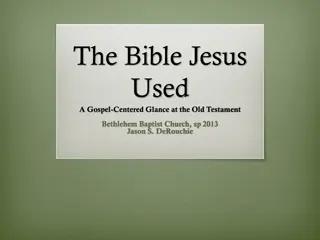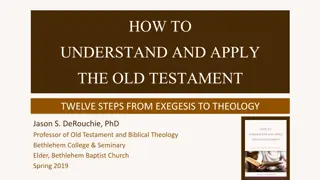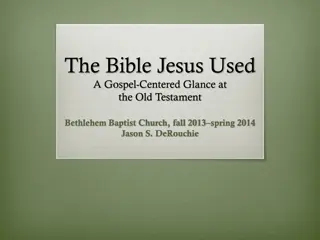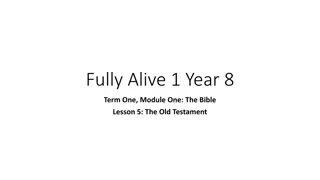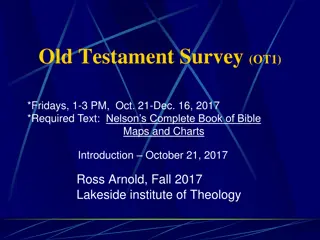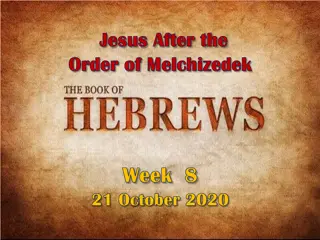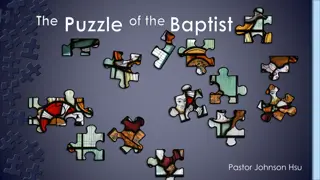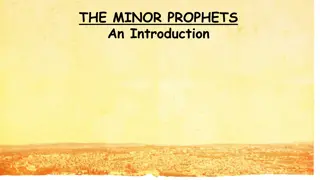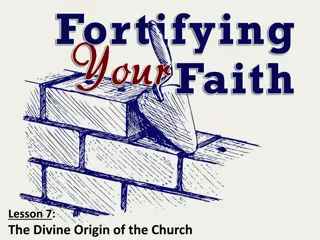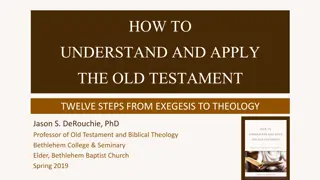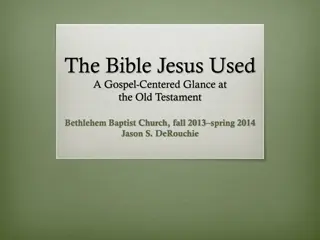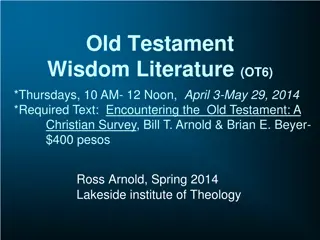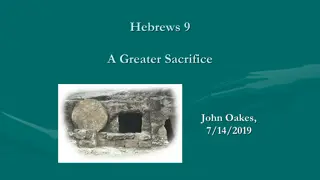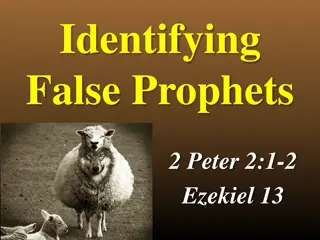Understanding the Former Prophets in the Old Testament
Delve into the distinction between historical and prophetic perspectives in the Former Prophets of the Old Testament, focusing on the Book of Joshua and the transition of leadership from Moses to Joshua as the Israelites prepare to enter the Promised Land.
Download Presentation

Please find below an Image/Link to download the presentation.
The content on the website is provided AS IS for your information and personal use only. It may not be sold, licensed, or shared on other websites without obtaining consent from the author. Download presentation by click this link. If you encounter any issues during the download, it is possible that the publisher has removed the file from their server.
E N D
Presentation Transcript
Old Testament The Former Prophets Joshua, Judges, 1st& 2ndSamuel, 1st& 2ndKings November 11, 2016 Lakeside Institute of Theology Ross Arnold, Fall 2016
The Problem of History in the Old Testament Christian systems usually categorize these books as Historical, while the Jewish Tanakh refers to them as the Former Prophets. Why the difference? History: a continuous, systematic narrative of past events, usually written as a chronological account. Herodotus: c. 485-425 BC, Greek historian, called the Father of History. Prophesy: Speaking or writing by divine inspiration. The Former Prophets do record historical events, but their purpose is not to write history as we understand it, but to record God s action in fulfilling His covenant promises. Because these books record God s actions, perceived from that perspective, the Jews considered them prophetic. They are perhaps best understood as historic events from a prophetic perspective.
The Book of Joshua Author:Joshua (traditional) Date: circa 1405 BC- 1390BC Theme: Conquest of the Promised Land; assigning and settling of the Tribes of Israel throughout the Land. Purpose:To show God is faithful to keep His covenant promises. Outline: Campaign to Capture Canaan (1-12) Distribution of the Land (13-21) Final Section (22-24) Debt of the Tribes to God Return of Reuben, Gad & Manasseh Joshua s Farewell Speech
After the death of Moses the servant of the Lord, the Lord said to Joshua son of Nun, Moses' aide: 2 "Moses my servant is dead. Now then, you and all these people, get ready to cross the Jordan River into the land I am about to give to them to the Israelites. 3 I will give you every place where you set your foot, as I promised Moses. 4 Your territory will extend from the desert to Lebanon, and from the great river, the Euphrates all the Hittite country to the Mediterranean Sea in the west. 5 No one will be able to stand against you all the days of your life. As I was with Moses, so I will be with you; I will never leave you nor forsake you. 6 Be strong and courageous, because you will lead these people to inherit the land I swore to their ancestors to give them. law my servant Moses gave you; do not turn from it to the right or to the left, that you may be successful wherever you go. 8 Keep this Book of the Law always on your lips; meditate on it day and night, so that you may be careful to do everything written in it. Then you will be prosperous and successful. 9 Have I not commanded you? Be strong and courageous. Do not be afraid; do not be discouraged, for the Lord your God will be with you wherever you go." Joshua 1:1-9 7 "Be strong and very courageous. Be careful to obey all the
Moses dies. Joshua takes over. The Israelites prepare to enter the Land
Joshua Initial Appeal: Preparations to take the Land (1-5) Closing Appeal: Living in the Land (22-24) Distribution of the Land (13-21) Conquest of the Land (6-12)
The Book of Judges Anon., perhaps Samuel. c. 1380 BC-1045 BC God s provision through judges. Purpose:To clearly demonstrate Israel s need for God, and the consequences of disobedience. Author: Date: Theme: Outline: Failure to Complete the Conquest (1) The Judgment of God (2:1-3:4) The Deliverance of Israel (3:5-16:31) Othniel, Ehud and Shamgar (southern) Deborah & Barak (northern) Gideon, Abimelech, Tola, Jair (central) Jephthah (eastern) Ibzan, Elon, Abdon (2nd northern) Samson (western) Depravity of Israel (17:1-21:25)
After that whole generation had been gathered to their ancestors, another generation grew up who knew neither the Lord nor what he had done for Israel. 11 Then the Israelites did evil in the eyes of the Lord and served the Baals. 12 They forsook the Lord, the God of their ancestors, who had brought them out of Egypt. They followed and worshiped various gods of the peoples around them. They aroused the Lord's anger 13 because they forsook him and served Baal and the Ashtoreths. 14 In his anger against Israel the Lord gave them into the hands of raiders who plundered them. He sold them into the hands of their enemies all around, whom they were no longer able to resist. 15 Whenever Israel went out to fight, the hand of the Lord was against them to defeat them, just as he had sworn to them. They were in great distress. Judges 2:10-15
Then the Lord raised up judges, who saved them out of the hands of these raiders. 17 Yet they would not listen to their judges but prostituted themselves to other gods and worshiped them. Unlike their ancestors, they quickly turned from following the way of their ancestors, the way of obedience to the Lord's commands. 18 Whenever the Lord raised up a judge for them, he was with the judge and saved them out of the hands of their enemies as long as the judge lived; for the Lord relented because of their groaning under those who oppressed and afflicted them. 19 But when the judge died, the people returned to ways even more corrupt than those of their ancestors, following other gods and serving and worshiping them. They refused to give up their evil practices and stubborn ways. Judges 2:16-19
The Book of 1 Samuel Author: Date: Theme: Samuel (trad.) c. 930 BC and later Transition from theocracy under the judges to monarchy under kings. Purpose: God uses His prophet, Samuel, to give the people the king they want, Saul; but Saul s failure leads to David as king. Outline: Samuel, the Last Judge (1-8) Saul, the First King (9-15) David, the Second King (16-31)
But when they said, "Give us a king to lead us," this displeased Samuel; so he prayed to the Lord. 7 And the Lord told him: "Listen to all that the people are saying to you; it is not you they have rejected, but they have rejected me as their king. 8 As they have done from the day I brought them up out of Egypt until this day, forsaking me and serving other gods, so they are doing to you. 9 Now listen to them; but warn them solemnly and let them know what the king who will reign over them will claim as his rights." 1 Samuel 8:6-9
But Samuel replied: "Does the Lord delight in burnt offerings and sacrifices as much as in obeying the Lord? To obey is better than sacrifice, and to heed is better than the fat of rams. 23 For rebellion is like the sin of divination, and arrogance like the evil of idolatry. Because you have rejected the word of the Lord, he has rejected you as king." violated the Lord's command and your instructions. I was afraid of the men and so I gave in to them. 25 Now I beg you, forgive my sin and come back with me, so that I may worship the Lord." you. You have rejected the word of the Lord, and the Lord has rejected you as king over Israel! 24 Then Saul said to Samuel, "I have sinned. I 26 But Samuel said to him, "I will not go back with 1 Samuel 15:22-26
The Book of 2 Samuel Author: Date: Theme: Samuel (trad.) c. 930 BC and later The reign of King David and the growth of Israel under his leadership. Purpose: The story of David the most popular king and one of the most important figures in Jewish history is told with complete honesty, including successes, failures, faithfulness, sin and repentance. Outline: The Triumphs of David (1-10) The Transgressions of David (11) The Troubles of David (12-24)
"Now then, tell my servant David, 'This is what the Lord Almighty says: I took you from the pasture, from tending the flock, and appointed you ruler over my people Israel. . "'The Lord declares to you that the Lord himself will establish a house for you: 12 When your days are over and you rest with your ancestors, I will raise up your offspring to succeed you, who will come from your own body, and I will establish his kingdom. 13 He is the one who will build a house for my Name, and I will establish the throne of his kingdom forever. 14 I will be his father, and he will be my son. When he does wrong, I will punish him with a rod wielded by human beings, with floggings inflicted by human hands. 15 But my love will never be taken away from him, as I took it away from Saul, whom I removed from before you. 16 Your house and your kingdom will endure forever before me; your throne will be established forever.' 2 Samuel 7:8, 11-16
The Book of 1 Kings Author: Date: Theme: Unknown, but traditionally Jeremiah. c. 550 BC The reign of David s son, King Solomon, the peak of Israel s power & influence, the building of the Temple and palace, and Solomon s decline, leading to a divided kingdom. Purpose: To show how obedience to God led to greatness for Israel; while disobedience led to disruption of the kingdom. Outline: United Kingdom under Solomon (1-11) Divided Kingdom (12-22)
The Lord said to him (Solomon): "I have heard the prayer and plea you have made before me; I have consecrated this temple, which you have built, by putting my Name there forever. My eyes and my heart will always be there. integrity of heart and uprightness, as David your father did, and do all I command and observe my decrees and laws, 5 I will establish your royal throne over Israel forever, as I promised David your father when I said, 'You shall never fail to have a successor on the throne of Israel.' and do not observe the commands and decrees I have given you and go off to serve other gods and worship them, 7 then I will cut off Israel from the land I have given them and will reject this temple I have consecrated for my Name. 4 "As for you, if you walk before me faithfully with 6 "But if you or your descendants turn away from me 1 Kings 9:3-7
The Book of 2 Kings Author: Date: Theme: Unknown, but traditionally Jeremiah. c. 550 BC The story of the two divided kingdoms, of the prophets Elijah and Elisha, and the fall of the Northern Kingdom to Assyria and the Southern Kingdom to Babylon. Purpose: To teach that unfaithfulness to God will lead to righteous discipline. Outline: Divided Kingdom (1-16) Fall of Israel in the North-722 BC (17) Surviving Kingdom of Judah (18-24:16) Fall of Judah-586 BC (24:17-25:30)
The king of Assyria invaded the entire land, marched against Samaria and laid siege to it for three years. 6 In the ninth year of Hoshea, the king of Assyria captured Samaria and deported the Israelites to Assyria. He settled them in Halah, in Gozan on the Habor River and in the towns of the Medes. Lord their God, who had brought them up out of Egypt from under the power of Pharaoh king of Egypt. They worshiped other gods 8 and followed the practices of the nations the Lord had driven out before them, as well as the practices that the kings of Israel had introduced. 9 The Israelites secretly did things against the Lord their God that were not right. From watchtower to fortified city they built themselves high places in all their towns. 10 They set up sacred stones and Asherah poles on every high hill and under every spreading tree. 11 At every high place they burned incense, as the nations whom the Lord had driven out before them had done. They did wicked things that provoked the Lord to anger. 12 They worshiped idols, though the Lord had said, "You shall not do this." 13 The Lord warned Israel and Judah through all his prophets and seers: "Turn from your evil ways. Observe my commands and decrees, in accordance with the entire Law that I commanded your fathers to obey and that I delivered to you through my servants the prophets." 2 Kings 17:5-13 7 All this took place because the Israelites had sinned against the
On the seventh day of the fifth month, in the nineteenth year of Nebuchadnezzar king of Babylon, Nebuzaradan commander of the imperial guard, an official of the king of Babylon, came to Jerusalem. 9 He set fire to the temple of the Lord, the royal palace and all the houses of Jerusalem. Every important building he burned down. 10 The whole Babylonian army, under the commander of the imperial guard, broke down the walls around Jerusalem. 11 Nebuzaradan the commander of the guard carried into exile the people who remained in the city, along with the rest of the populace and those who had gone over to the king of Babylon. 12 But the commander left behind some of the poorest people of the land to work the vineyards and fields. So Judah went into captivity, away from her land. 2 Kings 25:8-21
